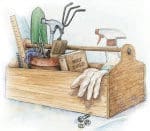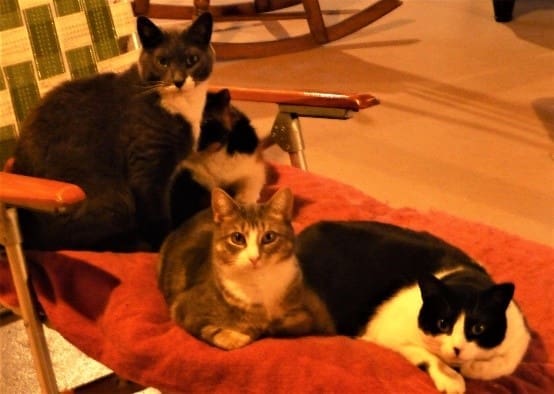Hello, Reader. Br. Ricky here with a couple questions for you.
What’s your take on the book of Ecclesiastes?
Do you find it puzzling?
Or maybe even a tad depressing?
My fur stands on end with the drone that “all is vanity.” Really??
The Vain History of “Vanity”
The King James version of the Bible, published in 1611, translated the Hebrew word hevel.” as “vanity,” i.e., worthless, futile, etc. This has stuck like glue, even in the newest translation, the New Revised Standard Version Updated Edition (NRSVUE).
“Vanity of vanities, says the Teacher,
vanity of vanities! All is vanity.” Ecclesiastes1:2 NRSVUE
Is all we do in this life futile? We are made in God’s image, right? Well, at least you humans are. Is the length of our days pointless? Hiss!
Dexter Aloisios Walker, student of theology and feline monastic history, appears distressed after reading Ecclesiastes.
Benedict’s View of Life
I don’t think that Benedict felt life to be futile or he wouldn’t have said this.
“But as we progress in this way of life and in faith, we shall run on the path of God’s commandments, our hearts overflowing
with the inexpressible delight of love.” Prologue 49
Benedict asks us to open our eyes to the light that comes from God (Prologue 9). He reminds us that God love points us in the direction of a meaningful life.
“What is more delightful than this voice of the Holy One calling to us?
See how God’s love shows us the way of life.” Prologue 19-20
Br Robert, OSB-C (Order of St. Benedict-Canine),
is curious about St. Benedic’s take on Ecclesiastes.
I wonder what the wise abbot thought of Ecclesiastes.
FYI, Benedict does not included quotes from this book in his Rule.
Br. Ricky Visits an Fascinating and Beautiful Art Exhibit
After leaving St. Benedict’s Monastery in St. Joseph, Minnesota, Amma and I visited Westminster Presbyterian Church in Minneapolis. This was Amma’s church when she was growing up and is still one of her spiritual homes.
In the Westminster Gallery we happened upon an art exhibit on book of Ecclesiastes. This was timely. We had heard readings from this book at monastery services. Each reading left me once again scratching my fur. That life is an exercise in futility or meaningless just doesn’t track with my Benedictine brain. But this exhibit gave me real food for thought.
Artist Debra Band had collaborated with philosopher Menachem Fisch to develop a stunning philosophical and visual interpretation of Ecclesiastes in their book Qohelet: Searching for a Life Worth Living. The Westminster exhibit presented Band’s art and Fisch’s interpretation of the ponderings of Qoheleth and his search for meaning in life.
The word Qohelet (קֹהֶ֫לֶת and pronounced co hell’ et) means “assembler” or “convener” and refers to the speaker in the Book of Ecclesiastes. The Latin for Qohelet is translated “Ecclesiastes.” Although traditionally attributed to Solomon, we really don’t know who the writer of Ecclesiastes (Qohelet) actually was.
Br. Ricky Discovers a New Translation of Hevel
Here’s what grabbed my attention. Fisch restores the literal translation of the Hebrew word “hevel.” This meaning is “vapor.”
“[Translating hevel as vapor] upends common interpretations of Qohelet as judgment on human efforts as mere futility. Instead, the ‘vapor’ is a real, encompassing presence, like a mist, and will also ‘vaporize’ or pass away – a reality that does not make human efforts futile, but rather emphasizes the uncertainty, limits, and fragility of human life, ultimately encouraging the reader to be attentive and grateful in the present moment.” [1]
Mist, wherever it appears, will ultimately vanish.
Br. Ricky Has An Epiphany
Meow! As a Benedictine feline this made sense to me. If hevel is translated as “vanity,” the message of the book that life is futile or meaningless. But if hevel is translated as “vapor,” like a mist that will disappear, a whole new interpretation unfolds. Perhaps the tone of Ecclesiastes is not to be pessimistic, but realistic.
Life and all we do is time bound, transient, mist-like in its impermanence. Nothing is forever. But this doesn’t mean that life is meaningless or futile. To me, that spells hope and an appeal to live in the present moment.
A Word About the Illuminations of Debra Band
Debra Band’s illuminations of each section of Eccelsiates make an important contribution to grasping this new way to understand Ecclesiates. Plus, they are beautiful!
Using calligraphy reminiscent of medieval illuminations, Band presents the text in both English and Hebrew. Each illustration mirrors the text.
She imagines Qohelet’s teachings using the grand thirteenth century Alhambra in Granada, Spain, as “the central metaphor for the beauty and transience of human life and accomplishments.” The palace becomes a metaphor for human life and deeds, a palace that will crumble and vanish like the mist. [2]
Gold leaf is liberally applied by Band. Each illumination is filled with the tiniest of details. I marveled at the intricacies of the scripture and poems that bordered many of her images that mirrored Qohelet’s text. She also used images from the time of Alhambra with contemporary images.
The frontispiece of the exhibit and the book.
Within a golden bowl Alhambra “symbolizes humankind’s dreams and illusions of immortality.” [3]
Band chose the golden bowl because at the close of the book, Qohelet imagines life to be like a broken golden bowl. See 12:6
Chapter 1:1-3 English text. The Hebrew text would be to the right. The illuminations are not large – 26” x 19” frame includes two illuminations –
English on the left, Hebrew on the right.
The tiny, tiny print (micrography) here and in the English and Hebrew texts for Chapter 1:1-3 includes the full text of Qohelet!!
Meeee-ow!! How did she do this? I encourage you to enlarge the above images if you can.
Br Cyprian Furbright, expresses fear that his crunchy treats might become vapor
The Quest of Qohelet
The entire book of Ecclesiastes documents Qohelet’s quest to find and “to understand a path to a wise and deeply fulfilling life.” Qohelet struggles “to perceive the individual’s ability – indeed responsibility – to find wisdom, to lead a meaningful life in the face of the transience of human life and achievements.” [4]
As we read Ecclesiastes we join Qohelet in his journey of reflection and discovery. I think we ALL want to know how to live a meaningful, joyful, and fulfilling life.
I share some of Qohelet’s discoveries below. I include accompanying words from The Rule of St. Benedict.
What Qohelet Discovers About Life
We Will Not Comprehend Life Nor The Ways of God
Qohelet gave his heart “to know wisdom, and to know madness and folly.” (Chapter 2:12. Subsequent quotations from Qohelet – Ecclesiastes will cite chapter and verse only.) But he realized that this was a striving after the wind. Neither could be captured just like the mist cannot be captured. We will never perceive God’s ways. We will never fully understand what life is all about.
“Place your hope in God alone.” RB 4.41
“And finally, never lose hope in God’s mercy.” RB 4.74
Everything Has a Proper Place and Time
Qohelet comes to realize the “every human moment has its place in cosmic time, whether or not the individual can perceive that place.” [5 ] There is a time for everything he declares in the familiar litany of Chapter 3.
“For everything there is a season, and a time for everything under heaven.” (3:1. See the familiar text at 3:2-8 where Qohelet states that each aspect of life has its opposite moment.)
“From Easter to Pentecost, the monastics eat at noon and take supper in the evening. Beginning with Pentecost and continuing throughout the summer, the members fast until midafternoon on Wednesday and Friday, unless they are working in the fields or the summer heat is oppressive.” RB 41.1-2
Be in the Present Moment
That life is a mist and that we cannot comprehend God’s ways is not a cause for despair. Instead, writes Qoheleth, we are to be happy, to enjoy ourselves, and to eat and drink and take pleasure in our toil. It is God’s gift to us. (3:12-13)
Qohelet directs us to the present moment and to a life of acceptance of what is. Sounds like Saint Benedict to me.
“I know that there is nothing better for them than to be happy and enjoy themselves as long as they live; moreover it is God’s gift that they should eat and drink and talke pleasure in all their toil.” 3:12-13
“Let us get up then, at long last, for the Scriptures rouse us when they say: It is high time for us to arise from sleep” (Rom. 13:11). Prologue 8
Band’s illumination for Chapter 3:9-15 on the transience of life. Even though we cannot know God’s ways, Qohelet offers a path of hope by being present to God’s gifts to us.
Life Presents Choices
One can be righteous and wise or wicked and a fool. Qohelet says seems to say that to be a bit of both is inevitable for humans (and felines).
Do not be too righteous or too wise, he declares, or too wicked or be a fool. (7:16-17)
I think he recognizes that 1) the former can lead to righteous pride and, that 2) the latter is inevitable.
““See, this alone I have found, that God made human being straightforward, but they have devised many schemes.” (7:29)
Ricky mews, “I even seen schemes in the Feline Cloister, especially when treats are dispensed on holy days!
“It is easy to recognize a bitter spirit of wickedness which creates a barrier to God’s grace and open the way to the evil of hell. But equally there is a good spirit which frees us from evil ways and brings us closer to God and eternal life.” RB 72.1-2 Trans Patrick Barry, OSB
.Worldwide Novice Angelo of Castelmola, Sicily chooses the good zeal of forgiveness.
He gives Tommaso a reconciling head bump.
Life is Arbitrary and Uncertain
In Chapter 9 Qohelet reflects on the certainty of death and the arbitrariness of life. Times and chance happen to all, Qohelet muses. (9:11c)
Band illustrated life’s arbitrariness with the death of an aristocrat. In the image below, notice the sheet being drawn over the head, the pills, the closed book. She explains that the black and white floor “resembles the board on which we play so many games of chance.” [6]
On the right with the Hebrew text, Band illustrates our vulnerability to the larger forces in life that come through national fortunes.
“Day by day remind yourself that you are going to die.” RB 4.47
This instruction from the Rule to remember death is not morbid.
Benedict encourages us to live rightly and search for God. To seek God is the main directive for our lives as expressed in Benedict’s Rule. Our days are limited. Let us make the most of them!
Life is Vapor, a Mist; Yet Life is To Be Lived With Joy
Qohelet offers a realistic view of life, but the bottom line is this.
“Light is sweet, and it is pleasant for the eyes to see the sun. Even those who live many years should rejoice in them all, yet let them remember that the days of darkness will be many. All that comes is vapor.” (11:7-8)
“Do not be daunted immediately by fear and run away from the road that leads to salvation. It is bound to be narrow at the outset.
But as we progress in this way of life and in faith, we shall run on the path of God’s commandments, our hearts overflowing with the inexpressible delight of love.” Prologue 48-49
Qohelet’s Parting Words
“Vapor of vapor, says the Teacher; all is vapor.” (12:6-8)
Yes, all is fleeting. But Qohelet insists “on pursuing and cherishing what is lovely despite its impermanence and the reality of our own death.” [7]
Reverence God, accept the reality of our lives, find joy in our life, work, and in the moment.
“The end of the matter; all has been heard. Fear God, and keep his commandments, for that is the whole duty of everyone.” (12:13)
“We must, then, prepare our hearts and bodies for the battle of holy obedience to God’s instructions. What is not possible to us by nature, let us ask the Holy One to supply by the help of grace.” Prologue 40-41
Hevel and Humility
Here’s a final mew for you.
Perhaps Qohelet (Ecclesiastes) describes a path to humility. We will not know everything. We are neither in charge of nor the center of the universe. We have connections with every other human being as we humble ourselves before God.
All we do, accomplish and possess are like vapor. All will vanish like mist. But take heart and focus on God who shows us the way of life.
“The first step of humility, then, is that we keep the reverence of God always before our eyes (Ps 36:2) and never forget it.” RB 7.10
Intrigued? – Please Read the Book of Ecclesiastes
I encourage you to read Ecclesiastes substituting “vapor” for “vanity.” You could also substitute “mist,” “passing away,” or “fleeting.” Doing this sure helped me better understand this beautiful and profound book.
Thank you for joining me. I hope that what I shared helps you to get a new view of Ecclesiastes – Qohelet.
Your Benedictine feline friend,
Br. Ricky, OSB-F
Novice Master and Mewsletter Editor
ENDNOTES
[1] Source: Exhibition Brochure
[2] Debra Band and Menachem Fisch, Qohelet: Searching for A Life Worth Living (Waco, TX: Baylor University Press, 2023), 16.
[3] Ibid., 90.
[4] Ibid., 16.
[5] Exhibition Plaque
[6] Exhibition Plaque
[7] Ellen F. Davis in Band and Fisch, ii.

















